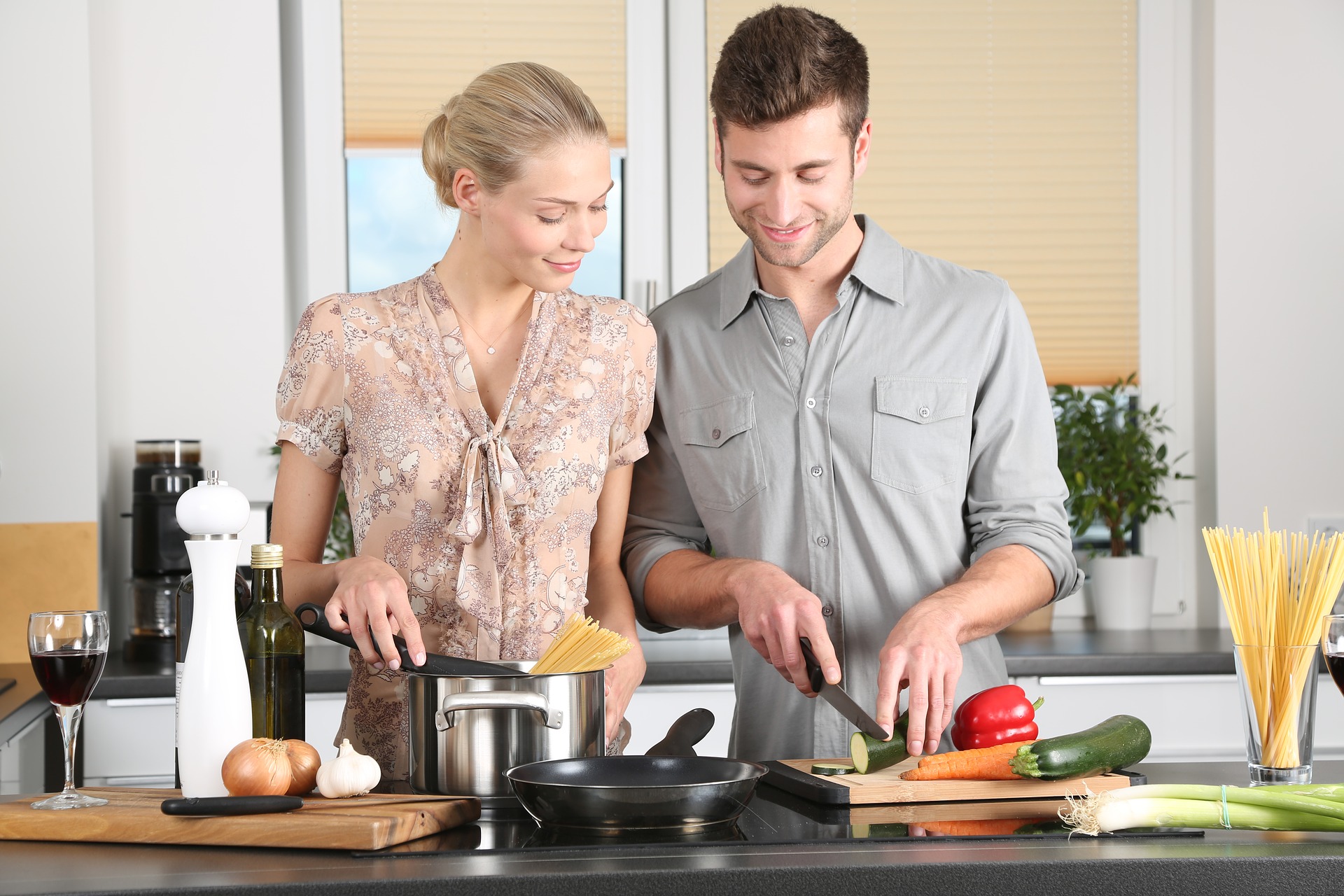Image by Werner Heiber from Pixabay
In this post we’ll look at some German vocabulary and expressions for an important part of everyday life: die Küche, -n the kitchen. Kochst du? Do you cook? No matter how you answer, you probably spend a decent amount of time in the kitchen, so let’s dig in.
Teller, Tassen, Gabeln Plate, Cups, Forks
Let’s start with the things you use to eat. Of course the basics are: der Teller, -Ø plate, die Schüssel, -n bowl, das Messer, -Ø knife, der Löffel, -Ø spoon, die Gabel, -n fork, das Essstäbchen, -Ø chopsticks, die Tasse, -n cup, das Glas, -¨er glass, die Serviette, -n napkin.
- Wo sind die Gabeln, Messer und Löffel?
Where are the forks, knives, and spoons? - Die Gabeln, Messer und Löffel sind in der Schublade.
The forks, knives, and spoons are in the drawer. - Die sauberen Gläser sind im Küchenschrank.
The clean glasses are in the cabinet.
- Die Kaffeetassen stehen im Regal.
The coffee cups are on the shelf. - Ich habe ein Weinglas zerbrochen.
I broke a wine glass. - Benutzt du Essstäbchen aus Holz oder aus Metall?
Do you use wooden or metal chopsticks? - Könnte ich bitte eine Serviette haben?
Could I have a napkin, please? - Hast du größere Suppenteller?
Do you have bigger bowls for the soup? - Stell bitte die sauberen Teller in den Küchenschrank.
Please put the clean plates in the cabinet.
Küchengeräte Kitchen Appliances
Even if you don’t have a lot of gadgets in your kitchen, you’ve probably got most of these: ein Kühlschrank a refrigerator, ein Herd/eine Herdplatte a stove/cooker, ein Ofen an oven, eine Mikrowelle a microwave oven, ein Toaster a toaster, ein Spülstein a sink, eine Geschirrspülmaschine a dishwasher.
- Die Milch ist im Kühlschrank.
The milk is in the refrigerator. - Mach bitte den Kühlschrank zu!
Close the refrigerator door please! - Ich koche Suppe auf dem Herd.
I cook soup on the stove. - Ich backe Kuchen und Brot im Ofen.
I bake cakes and bread in the oven. - Ich wärme Reste in der Mikrowelle auf.
I reheat left-overs in the microwave. - Ich mache Toast im Toaster.
I make toast in the toaster. - Das schmutzige Geschirr ist im Spülstein.
The dirty dishes are in the sink. - Ich muss die Geschirrspülmaschine ausräumen.
I need to empty the dishwasher.
And depending on where you live and what you like to eat, there’s also: ein Reiskocher a rice maker, eine Kaffeemaschine a coffee maker, ein Wasserkocher an electric kettle, ein Schongarer a slow cooker, eine Heißluftfritteuse an air fryer, ein Brotbackautomat a bread machine, eine Eismaschine an ice-cream maker, eine Fritteuse a deep fryer.
- Ich benutze immer einen Reiskocher. Ich koche nie Reis auf dem Herd.
I always use a rice cooker. I never cook rice on the stove. - Wir brauchen eine neue Kaffeemaschine.
We need a new coffee maker. - Ich koche Wasser im Wasserkocher.
I boil water in the electric kettle. - Benutzt du oft deinen Schongarer?
Do you use your slow cooker often? - Heißluftfritteusen brauchen nicht viel Öl.
Air friers don’t use a lot of oil. - Ich backe Brot im Brotbackautomat.
I make bread in the bread maker. - Ich habe zum Geburtstag eine Eismaschine bekommen.
I got an ice cream maker for my birthday. - Fritteusen brauchen viel Öl.
Deep friers use a lot of oil.
Schneidebretter und Rührschüsseln. Cutting boards and Mixing Bowls
No matter how much you cook, you probably have at least a few of these: ein Schneidebrett a cutting board, eine Messergarnitur a set of knives, eine Rührschüssel a mixing bowl, ein Holzlöffel a wooden spoon, eine Suppenkelle a ladle, eine Küchenmaschine a food processor, ein Handmixer an electric mixer, ein Wok a wok, ein Backblech a baking sheet, eine Backform a baking pan, eine Bratpfanne a frying pan, ein Topf a pot.
- Ich schneide Gemüse auf einem Schneidebrett.
I cut vegetables on a cutting board. - Auf der Arbeitsfläche ist kein Platz.
There’s no space on the counter. - Hast du einen Satz scharfe Messer?
Do you have a set of sharp knives? - Ich vermische die Zutaten in einer Rührschüssel.
I mix ingredients in a mixing bowl. - Ich rühre Suppe mit einem Holzlöffel.
I stir soup with a wooden spoon. - Ich serviere Suppe mit einer Suppenkelle.
I use a ladle to serve soup. - Küchenmaschinen sind schnell und praktisch.
Food processors are fast and convenient. - Benutzt du oft einen Handmixer?
Do you use an electric mixer often? - Die Plätzchen sind auf dem Backblech.
The cookies are on the baking sheet. - Ich backe Fisch in einer Backform.
I cook fish in a baking pan. - Ich benutze den Wok sehr oft.
I use the wok very often. - Ich brate Eier in einer Pfanne.
I cook eggs in a frying pan. - Hast du einen großen Suppentopf?
Do you have a large pot for the soup?
Ich mache das Abendessen. I’m Making Dinner
If you’re looking for vocabulary and expressions related to cooking, check out this post. And here’s a bunch of food vocabulary that will come in handy when you’re talking about eating or cooking:
- das Brot, -e bread
- der Reis rice
- die Pasta/Teigwaren pasta
- die Nudel, -n noodles
- das Fleisch meat
- das Huhn, -¨er chicken
- das Rind(fleisch) beef
- das Schweinefleisch pork
- der Schinken ham
- der Fisch, -e fish
- das Lamm, -¨er lamb
- der Tofu tofu
- das Gemüse vegetables
- die Tomate, -n tomato
- die Zwiebel, -n onion
- der Knoblauch garlic
- der Salat lettuce
- der Spinat spinach
- der Spargel asparagus
- der Kohl cabbage
- der Pilz, -e/der Champignon, -s mushroom
- die Salatgurke, -n cucumber
- die Paprikaschote, -n pepper (as in bell)
- die Chilischote, -n chili pepper
- die Frucht, -¨e fruit
- der Apfel, -¨Ø apple
- die Birne, -n pear
- der Pfirsich, -e peach
- die Orange, -n/die Apfelsine, -n orange
- die Zitrone, -n lemon
- die Weintraube, -n grape
- die Erdbeere, -n strawberry
- die Banane, -n banana
- die Nuss, -¨e nut
- die Erdnuss, -¨e peanut
- der Samen, -Ø seed
- der Weizen wheat
- die Frühstücksflocken cereal
- das Salz salt
- der Pfeffer pepper
- der Sesam sesame
- der Honig honey
- der Zucker sugar
- das Ei, -er egg
- die Milch milk
- das Wasser water
- der Tee, -s tea
- der Kaffee coffee
- der Wein, -e wine
- das Bier, -e beer
- die Sojamilch soy milk
- die Sojasauce soy sauce
- der Käse cheese
- die Eiskrem ice cream
- der Kuchen, -Ø cake
- die Torte, -n pie
- das Plätzchen, -Ø cookie
- die Süßigkeit, -en candy
- essen (ich esse, du isst) to eat
- trinken to drink
- kochen to cook
- probieren to taste
Behälter, Gläser und Tüten Containers, Jars, and Bags
Different foods are stored in different types of containers, so may want to say:
- eine Schachtel Pasta/Plätzchen/Frühstücksflocken
a box of pasta/cookies/cereal - ein Beutel Kartoffeln/gefrorenes Gemüse
a bag of potatoes/frozen vegetables - eine Flasche Wasser/Wein
a bottle of water/wine - ein Karton Milch/Saft
a carton of milk/juice - eine Dose Bohnen/Thunfisch/Suppe
a can of beans/tuna/soup - ein Glas Oliven/Gewürzgurken/eingemachtes Obst
a jar of olives/pickles/fruit preserves - eine Packung Ketchup/Mayonnaise
a container of ketchup/mayonnaise - eine Packung Huhn/Tofu
a package of chicken/tofu
Die Küche ist sauber! The kitchen is clean!
Even if you don’t use it much, the kitchen always seems to need cleaning. And there’s a whole set of vocabulary that you can use to talk about that: ein Besen a broom, ein Mopp/Feudel a mop, ein Schwamm a sponge, (Geschirr)spülmittel dish detergent, ein Geschirrtuch a dishtowel, Sprühreiniger a spray cleaner, ein Blatt Küchenkrepp a paper towel, ein Eimer a bucket, Fußbodenreiniger floor cleaner, der Abfalleimer trash can/bin.
- Ich muss spülen.
I need to do the dishes. - Wir müssen Spülmittel kaufen.
We need to buy dish detergent. - Ich mache den Abwasch mit einem Schwamm und einem Geschirrtuch.
I use a sponge and a dishtowel to do the dishes. - Ich fege den Fußboden mit einem Besen.
I sweep the floor with a broom. - Ich wische den Fußboden, wenn er dreckig ist.
I mop the floor when it’s dirty. - Ich wische die Arbeitsfläche mit Küchenkrepp und Sprühreiniger.
I wipe the counter with a paper towel and a spray cleaner. - Ich gebe Fußbodenreiniger und warmes Wasser in den Eimer.
I put floor cleaner and warm water in the bucket. - Ich muss den Abfall rausbringen.
I need to take out the trash. - Der Abfalleimer stinkt!
The trashcan smells bad!
Do you want to learn German?
Check out our other posts on German language, culture, and more. And if you’re looking for convenient and affordable live German lessons with a real teacher, check out The Language Garage German. Our lessons are given online in a virtual classroom, so it doesn’t matter where you live or work. We can come to you. And we have flexible options, with a free trial so that you can decide if there’s a fit. Check us out!






